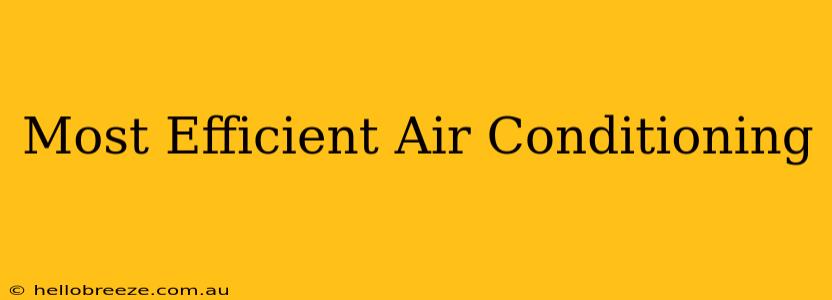Summer's heat can be brutal, driving up energy bills along with the temperature. Finding the most efficient air conditioning system is crucial for both your comfort and your wallet. This guide will walk you through the key factors to consider when choosing an energy-efficient AC unit and help you keep your cool without breaking the bank.
Understanding SEER Ratings: The Key to Efficiency
The Seasonal Energy Efficiency Ratio (SEER) is the most important metric to look at when assessing air conditioner efficiency. SEER measures the cooling output over an entire cooling season relative to the energy consumed. The higher the SEER rating, the more efficient the unit. While minimum SEER requirements vary by location and year of manufacture, aiming for a unit with a SEER rating of 16 or higher is generally recommended for significant energy savings. Units with SEER ratings above 20 are considered highly efficient.
Types of Efficient Air Conditioners
Several types of air conditioners offer high efficiency:
1. Heat Pump Air Conditioners
Heat pumps are incredibly versatile and offer high SEER ratings. They can both cool and heat your home, making them a cost-effective solution year-round. In cooling mode, they extract heat from your home and release it outside. In heating mode, they reverse the process, drawing heat from the outside air even in relatively cold temperatures.
2. Ductless Mini-Split Systems
Ductless mini-split systems are a great choice for zoned cooling, allowing you to cool only the areas of your home that need it. This targeted approach minimizes energy waste compared to a whole-house system constantly running. They are also known for their high efficiency and quiet operation.
3. Variable-Speed Air Conditioners
Unlike traditional single-speed units, variable-speed ACs can adjust their cooling power based on your home's needs. This precise control prevents energy waste by avoiding the constant on/off cycling of single-speed systems. They provide consistent cooling and increased energy efficiency.
Beyond SEER: Other Efficiency Factors
While the SEER rating is paramount, other factors contribute to overall efficiency:
- Proper Sizing: An AC unit that's too small will work harder and less efficiently, while one that's too large will cycle on and off frequently, wasting energy. Professional sizing is crucial.
- Regular Maintenance: Regular maintenance, including filter changes and professional inspections, can significantly improve your AC's efficiency and lifespan. Schedule annual maintenance.
- Energy Star Certification: Look for the Energy Star label. This indicates the unit meets strict energy-efficiency guidelines set by the EPA.
- Insulation and Sealing: Proper insulation and sealing of your home reduces the amount of heat entering, reducing the workload on your AC and boosting efficiency. Improve your home's insulation.
Choosing the Right Efficient AC for Your Needs
Selecting the most efficient air conditioning system involves careful consideration of your home's size, layout, climate, and budget. Consulting with a qualified HVAC professional is highly recommended to ensure you choose the right system for your specific needs. They can assess your home's cooling requirements and recommend the most efficient and cost-effective solution.
Remember, investing in a highly efficient air conditioning system is an investment in both comfort and long-term savings. By understanding SEER ratings, exploring different types of AC units, and implementing energy-saving practices, you can stay cool and comfortable while keeping your energy bills under control.

